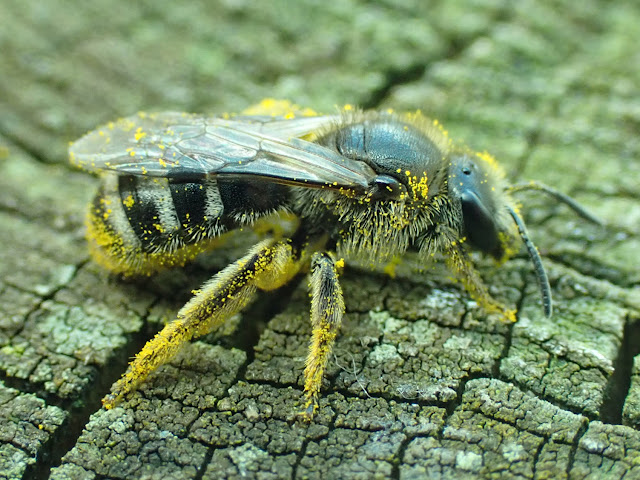The only signs of migration came from the beach and estuary with a noticeable increase in waders, even allowing for the increased tide height. This was confirmed by the arrival of an Icelandic ringed Oystercatcher, presumably still heading north. Counts included 72 Dunlin, 48 Sanderling, 10 Ringed Plover, nine Whimbrel, two Turnstone and a Knot.
The Dark-bellied Brent Goose was still present in the estuary with a pair of Eider offshore.
Wildlife News: In the continuing fine weather bees were especially active with several Red Mason Bee searching out suitable nest holes. Sandpit Mining Bee were the most numerous with several Orange-tailed, Chocolate A. scotica and Short-fringed Mining Bee A. dorsata. A pollen-covered Bronze Furrow Bee Halictus tumulorum was the first sighting of the year.
Cuckoo bees were also numerous with at least a dozen male Flavous Nomad Bee scattered around the site seeking out females, and a couple of Gooden's Nomad Bee also noted.
Also new for 2023, Wasp Beetle Clytus arietis and Thick-legged Flower Beetle Oedemera nobilis and the first Formica cunicularia ant was active at the nest site along on the railway wall.
A couple of Lackey moth nests continue on a Hawthorn on the Dune Ridge, growing well since first discovered on 22 Apr.
Despite the weather, with fewer migrants just seven butterfly species were on the wing, the majority of species remain in low numbers, with very few Speckled Wood, Green-veined White and Comma especially this spring. The first Blue-tailed Damselfly emerged from the Main Pond, presumably a few degrees cooler than the Dune Pond, which saw the first emergence.





No comments:
Post a Comment